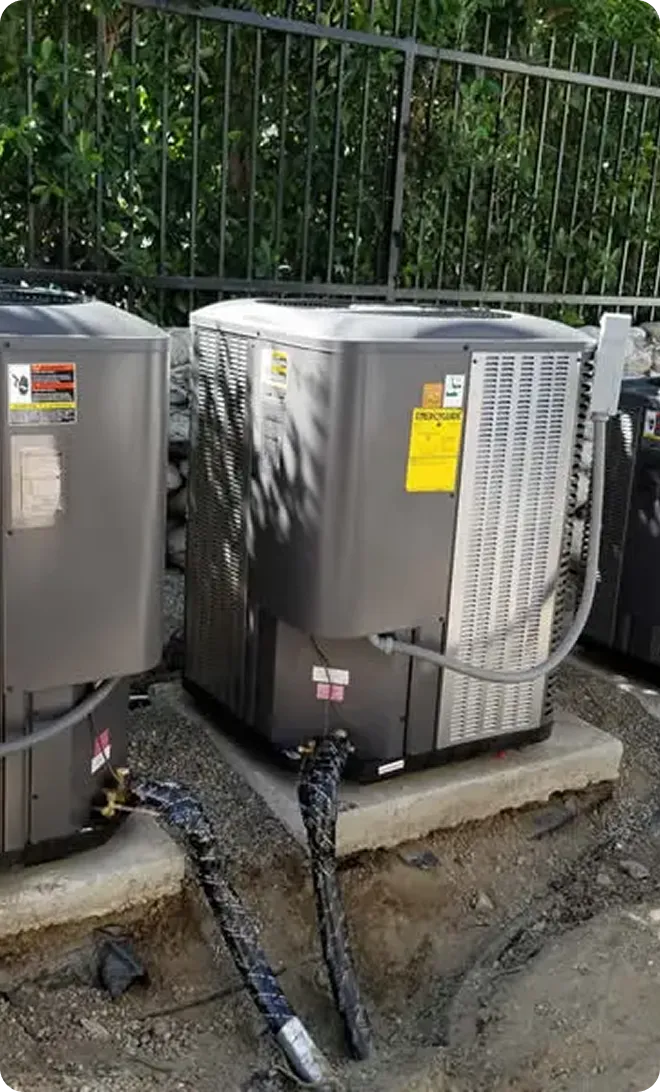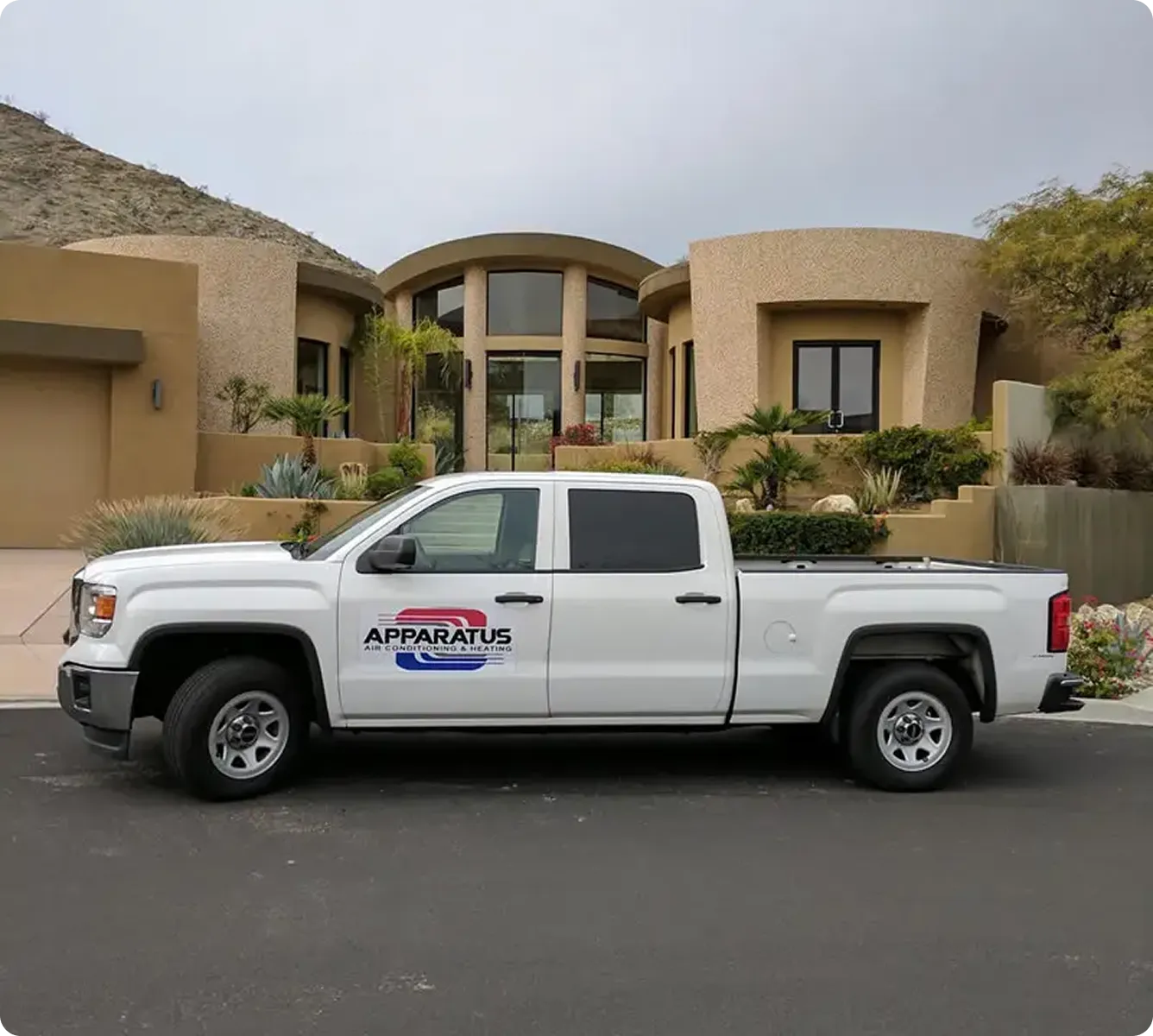
Mini Split Inspection in Bermuda Dunes, CA
Mini Split Inspection in Bermuda Dunes, CA
Keeping mini split systems running efficiently and safely is critical in Bermuda Dunes, where long, hot summers, blowing desert sand, and seasonal monsoon humidity combine to stress HVAC equipment. A professional mini split inspection identifies hidden problems—refrigerant leaks, restricted airflow, electrical wear, and condensate issues—before they become costly failures or safety hazards.
.jpg)
Why a mini split inspection matters in Bermuda Dunes, CA
- Desert dust and sand accumulate quickly on filters and coils, reducing airflow and heat transfer.
- High ambient temperatures increase compressor load and electrical stress, accelerating component wear.
- Late-summer monsoon storms bring humidity that can reveal condensate drainage problems and cause corrosion.
- Pre-sale or pre-install inspections protect buyers and installers by verifying system condition and readiness.
A targeted inspection reduces energy bills, extends system life, improves comfort, and documents condition for real estate transactions.
What a complete Mini Split Inspection in Bermuda Dunes, CA includes
Our inspections follow a structured checklist covering mechanical, electrical, refrigerant, airflow, condensate, and safety items, plus diagnostic testing and a written report with prioritized recommendations.
Detailed inspection checklist
- Mechanical
- Indoor and outdoor unit visual condition: mounting, vibration, corrosion
- Condenser and evaporator coil condition and cleanliness
- Fan blades and motors: alignment, noise, bearing play
- Cabinet seals and refrigerant line insulation
- Electrical
- Voltage and amp draw on compressor and fan motors
- Condition of wiring, terminal connections, and breakers
- Capacitor and contactor function
- Grounding and disconnect presence/condition
- Refrigerant
- System refrigerant type and charge verification
- Superheat/subcooling measurements where applicable
- Leak detection using electronic detectors and visual dye as needed
- Refrigerant line condition and fittings
- Airflow & Controls
- Filter condition and recommended replacement interval
- Supply/return air temperatures and temperature split
- Airflow obstructions, grille condition, and airflow patterns in rooms
- Thermostat and remote control calibration
- Condensate & Drainage
- Drain pan condition and slope of condensate piping
- Condensate trap/p-trap and check for blockages
- Signs of water damage or mold near indoor units
- Safety & Efficiency Assessment
- Carbon/combustion risk is checked for systems with auxiliary heat
- Overall system efficiency and recommendations for improvements
- Noise, vibration, and mounting safety concerns
Diagnostic testing and leak detection
Inspections include targeted diagnostic tests to confirm performance and reveal hidden faults:
- Electrical load testing to ensure components draw within manufacturer specs
- Temperature split and airflow measurements to detect reduced performance
- Refrigerant diagnostic testing: pressure readings and superheat/subcooling for proper charge
- Electronic leak detection across fittings and joints; UV dye application if necessary
- Condensate flow test to verify clear, functioning drainage
These diagnostics allow technicians to distinguish between performance loss from dirty components versus low refrigerant or failing parts—essential for correct repair selection.
Common mini split issues in Bermuda Dunes and typical solutions
- Clogged filters and dirty coils: clean coils, replace or upgrade filters, advise on increased replacement frequency (often monthly to every two months in desert conditions)
- Low refrigerant from small leaks: locate leak, repair or replace affected line/fitting, evacuate and recharge to manufacturer charge; test for reoccurrence
- Electrical wear: replace failing capacitors, contactors, or worn wiring; verify breaker and disconnect sizing
- Condensate backups and leaks: clear drains, repair/re-route piping, install condensate safety switches where needed
- Outdoor unit corrosion or pad settlement: clean and realign, replace damaged components, recommend corrosion-resistant parts or pad replacement
- Improper installation issues (pre-install inspection): identify insufficient line length options, improper placement, missing disconnect, or inadequate circuit capacity and provide pre-install guidance
Pre-sale and pre-install inspection specifics
- Pre-sale inspections: provide a neutral, documented assessment of system condition, remaining useful life estimates, safety concerns, and prioritized repairs or replacements suitable for buyer/seller disclosure.
- Pre-install inspections: verify electrical service capacity, breaker sizing, mounting locations, line set routing options, condensate routing, and potential code or permit concerns so installers can quote accurately and avoid field surprises.
Written inspection reports and recommendations
Every inspection results in a clear, professional written report that typically includes:
- Executive summary with overall condition and urgency levels (safety, recommended, optional)
- Photographs of problem areas (indoor/outdoor units, corrosion, leaks, electrical panels)
- Diagnostic readings (voltages, amp draw, temperature split, refrigerant pressures)
- Prioritized repair and upgrade recommendations with explanations of benefits (efficiency, reliability, safety)
- Notes specific to Bermuda Dunes climate impacts and maintenance recommendations
Reports are formatted for homeowners, buyers, or contractors to use for decision making or bidding.
How long inspections take and what to expect
A standard mini split inspection typically takes 60 to 90 minutes per system, longer if diagnostic leak detection or extensive testing is required. Inspections are non-invasive and focused on accurate readings and documentation. Expect clear explanations of findings and straightforward recommendations.
Benefits of timely inspection and routine maintenance
- Lower energy bills by restoring proper refrigerant charge and clean heat-exchange surfaces
- Fewer emergency breakdowns in peak summer months when cooling is essential
- Longer compressor and component life through early replacement of stressed parts
- Better indoor comfort and air quality by ensuring proper airflow and condensate management
- Documentation for real estate transactions or insurance purposes
Maintenance tips for Bermuda Dunes homes
- Replace or clean filters every 1–3 months in the desert, depending on dust and occupancy
- Keep 2 to 3 feet of clearance around outdoor units; brush and sand accumulation accelerate wear
- Schedule a professional inspection before the cooling season and after monsoon storms
- Ensure condensate lines are visible and flowing during humid periods to prevent backups
- Consider UV coil treatment or routine coil cleaning to combat dust accumulation
A professional mini split inspection in Bermuda Dunes, CA gives you the clarity to protect comfort, reduce costs, and plan repairs or replacements with confidence. The combination of local climate knowledge and detailed diagnostics ensures recommendations are practical, cost-effective, and tailored to desert conditions.

hear what our satisfied
clients have to say









.webp)